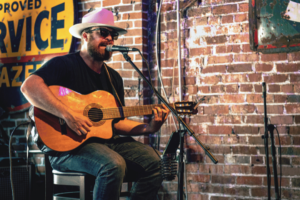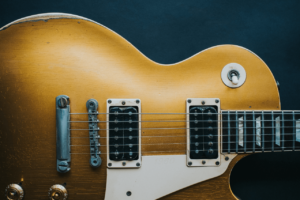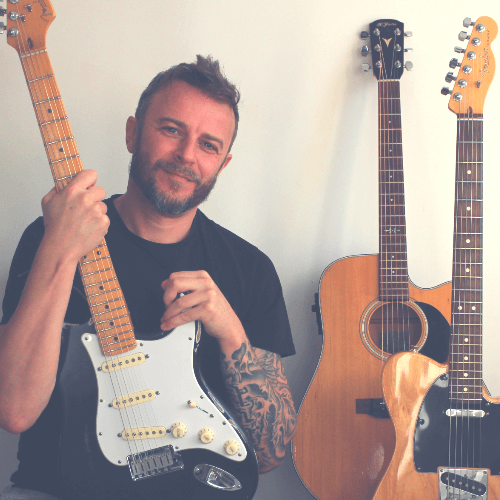It may seem like a mountain to climb when wanting to learn the guitar. Maybe it’s a daunting task, or you just can’t spare the time. Well, I’d like to show you the fascinating benefits of playing, and how to get yourself started. It’s a skill that can give you a lifetime of enjoyment.
I’ve been playing for around 25 years and I couldn’t imagine not having it in my life. I’d like to share these benefits of playing guitar with you, as you’ll see, some of them are truly amazing.
The Benefits Of Playing Guitar On The Brain
Cognitive
Scientific studies confirm guitarists have unique brain functions compared to nonplayers. Other musicians learn their instruments through sheet music. Guitar players can learn by listening and exploring their fretboard to find the notes or chords.
Extraordinarily so, guitarists can synchronize using the brain’s neural network. Without consciously knowing, they can predict what is to come before and after a set of chords. The more you jam with another guitarist, the stronger the chemistry becomes.
The Brain is made up of millions of nerves called Neurons. Neurons fire off signals whilst you’re performing ordinary duties. Almost all areas of the brain are functioning when you play guitar. Guitar playing causes The Corpus Callosum to link the rational left side of the brain, to the creative right. That’s pretty special.
Experienced guitarists can switch off the conscious part of the brain, triggering the unconscious. Over time you can learn to be less conscious of what you are doing and allow the art of playing guitar to emerge.

Creative Brain
Picking up a guitar and learning is a great way to add some creativity to your life. Develop your knowledge, write, arrange, bang out your own Jimmy Page style riff. The magic of writing your own material is unique and rewarding to the soul.
It’s so easy to send your music out to the world via social media. It’s nice to receive positive comments from family, friends, or a fan from the other side of the world. You have a creative brain, maybe you don’t know it yet. Grab a guitar, unlock this gift, and let it flow. You’ll be surprised by what you’re capable of.
I’ve always enjoyed learning from my favorite guitarists. That’s all I really wanted to do from the start. To feel like I was in the shoes of Jimi Hendrix, to observe, copy, and understand how Jimi created his art, is incredible. If you can get close to learning some of your own hero’s material. It’s so rewarding and addictive.
No Excuses, Re-String Your Brain
A Seattle-based musician was diagnosed with multiple sclerosis in 2002. His muscles developed weaknesses resulting in coordination problems. This made playing the guitar extremely difficult. By using the brain’s neuroplasticity, he relearned how to play chords and scales on the guitar.
The adult brain is capable of forming new cells. The undamaged neurons in the brain can sprout new nerve endings, rewiring the links to other cells.
Prolong Mental Degeneration
High activity musicians who play for 10 years or more, keep their brains sharp. All aspects of playing guitar help toward avoiding diseases like Alzheimer’s and Dementia.
The National Centre of Biotechnology tested 70 Seniors from the ages of 60 to 83. The tests were to clarify if playing guitar can slow down mental degeneration. The results revealed, those with 10 years of musical experience, had a far superior nonverbal memory, than those who had no experience whatsoever. This delayed the mental decline, preserving cognitive functioning in advanced age.
Health Benefits
We all have moments in our daily life when we’re feeling stressed, anxious, or in pain. When the body and mind senses a threat, cells in our body produce chemicals in response. Playing guitar can create an adverse counteraction to aid this emotion. Music literally has the power to make you feel better. So, next time your parents scream at you for playing AC/DC too loud, tell them it’s part of your therapy!
Meditation
Playing Guitar is a powerful form of Meditation for sure. It’s an escape. Whilst you’re strumming through those new chords, all other thoughts fade away.
It takes patience, peace, discipline, and practice to learn an instrument. To say guitar playing is therapeutic is an understatement.
The sound you create is entirely in response to what your brain is telling your fingers to do. Which is far superior to listening to music.
Emotional Benefits
Being able to express yourself via the guitar is a major plus. This adds such a positive vibe to your emotional health and well being.
Performing Emotion
I’ve been lucky enough to have played in clubs and bars quite a lot over the last 20 years. The emotional rush I get out of performing with a great band is nothing short of euphoria. Ask any musician about their feelings whilst playing live. It’s something very very special.

Social Benefits
Connecting with like-minded musicians is essential. You can learn so much from watching somebody else play. I would advise you to collaborate and learn with other guitarists. The social bonds through guitar can create camaraderie and most importantly, friendship forever. It doesn’t matter how good you are, you’ll always need people around you to create a strong social network.
Children’s Development Through Guitar
Children are constantly developing, they’re like a sponge, soaking up every experience. Children benefit the most from learning an instrument. These advantages include:
- Enhanced concentration
- Long term memory
- Comprehension skill
- Increased performance in other academic topics.
Measuring time signatures is Math. Whether it’s 4/4, 3/4, or 6/8, your child’s reasoning and mathematical understanding will improve.
Here’s a clip of Nandi Bushell, aged 10. She’s taking the UK by storm and has been on various TV shows and recently jammed with Lenny Kravitz. Nandi’s primarily a drummer (although she plays guitar too now). I was so inspired by this that I had to share it. Trust me when I say this is worth 1 min 10 seconds of your time. Just watch the power surging through her. This is a perfect example of what children can achieve at such a young age through music.
Learning A New Skill Is Easy Right?
You’ll Only Stick with Habits if you Enjoy it!. State the obvious!, but wait, Andrew Ferebee, Founder of Knowledge For Men explains:
There is a helpful process of creating habits, and sticking to them. They are;
The Cue:
The Cue or Trigger is the stage when you take some kind of action,’ I’m going to look for a guitar tutor’
The Action
This is the part where you book that guitar lesson or buy that acoustic I saw in the shop window.
The Reward
This is the section of the habit loop where the brain is rewarded for taking the desired activity.
These tips sound easy, yet a lot of people don’t complete The Action and fail.
Get yourself to the reward stage. You’re more likely to succeed in creating a New Habit if you try my essential tips.
Essential Tips
Don’t Give Yourself An Unrealistic Goal
Start with a goal that’s so small, you cannot fail. An example could be: Sit in the correct position with the guitar, hold your pick, and strum all the strings within 2 days. Get a feel for it.
Break Your Task Down. Keep The Tasks EASY
If your goal is to learn the E minor shape, start with memorizing where your fingers need to go. What fingers are you going to use?
Arrange A Schedule
Get yourself a calendar and write down your schedule. This is a visual reminder that’ll help, especially if you hang it up in the kitchen, or somewhere you’ll see it often.
Create Your Environment
The more energy it takes you to turn the TV off, walk into another room, get the guitar out, tune it, find a pick, the less likely you are to do it. Keep your guitar on a stand next to the TV or in a place you can see it. Guitars are a beautiful addition to anyone’s home.

Slipping – ‘Never Skip Twice’
You will miss a session. Sometimes you’ll make a mess of the task and get frustrated. That’s completely normal, but the golden rule is, never miss two lessons in a row. If you have to cancel a session with your guitar tutor or you don’t feel like sitting down to practice, only do it once!
Emotional Investment And Reward Over Willpower.
It’s true. It doesn’t matter how much willpower you put in, if you don’t emotionally reward yourself, you will get bored. Now, having willpower is still important to everything we do, but not as the end goal. If you treat music as a physical or mental exercise, it’ll become soulless and boring. Having skill on the guitar is an advantage in life, but if you’re not making a connection with yourself, it’s useless. Learning guitar is a journey, not a destination.
What’s The Rush?
Be patient. Daily improvement will start to show, and you’ll never look back. Slow and steady, that’s the key. Once you’ve eventually ripped out that Slash solo note for note, you’ll be glad you didn’t quit so easy.
Pass It On
Are you already a part of the guitar family? Influence/inspire someone else to begin. Get your friend or son/daughter to learn with you. If you know somebody who is starting off, you can blow their mind by passing your knowledge on. You now know the full benefits of playing guitar.
Summary
No hobby can give you so much enjoyment and such powerful implications for the brain’s development. Science has proven guitarists have that something special. With so many reasons to play guitar, it’s time to start your adventure. It doesn’t matter what standard of player you become. It doesn’t matter what age, religion, or culture you’re from. It’s an art form, so create your own by using a guitar.










